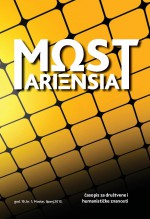Model regionalizacije Kraljevine Španjolske
Regionalization Model of the Kingdom of Spain
Author(s): Dražen BarbarićSubject(s): Government/Political systems, Inter-Ethnic Relations, EU-Approach / EU-Accession / EU-Development, Ethnic Minorities Studies
Published by: Sveučilište u Mostaru i Institut društvenih znanosti Ivo Pilar, Zagreb
Keywords: regionalization; autonomous communities; regional authorities; Europeanization; ethnic differences management; secessionism;
Summary/Abstract: In today’s political situation when the European Union is perceived as a specific political organization with a complex multilevel system of authority which overcomes national and minority problems, certain identity and political restlessness started to emerge in some member states. Spain is an excellent example of recent political instability created due to the announcement of the citizens referendum on potential self-determination in Catalonia. Economic crisis which has affected Spain is definitely a catalyst of the mentioned tendencies, but by no means the only and decisive factor in the political claims for independence or at least greater autonomy within Spain. The latter has a long history of conflict between centralist and regional-federal traditions, and the complexity of its identity in no way corresponds to the centralized system of government and political territorialization. Therefore, the challenging themes of Spanish regional model, its problems and requirements for its revisionism are extremely important issues which require careful study from multiple aspects that such model implies. This paper is not a comprehensive analysis of Spanish regional organization, but a brief overview of its most significant elements reaffirmed in the most recent events as well as their positioning within appropriate theoretical models for easier understanding and interpretation.
Journal: Mostariensia - časopis za društvene i humanističke znanosti
- Issue Year: 19/2015
- Issue No: 1
- Page Range: 131-148
- Page Count: 18
- Language: Croatian

